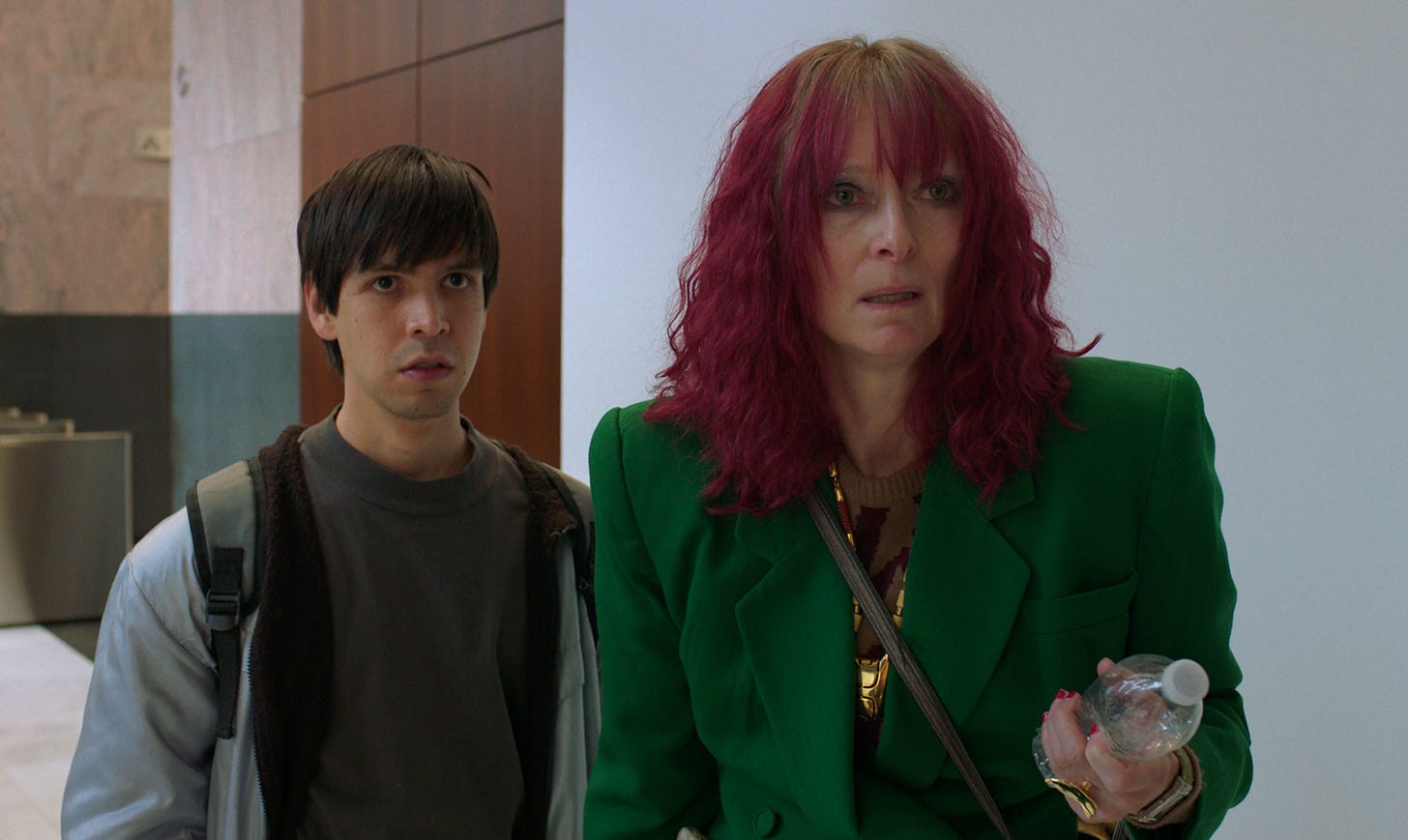Problemista is a study of uselessness, an artistic exercise that questions the worth of arbitrary rules that don’t help any of the people whom they’re intended to serve. Writer-director-star Julio Torres takes delight in the absurdity of modern existence, creating a version of New York that is summed up in an early shot of framed posters of the city skyline, discarded amongst garbage bags waiting for pickup on the curb. Tucked in with the trash are brightly colored toys and iridescent umbrellas, the detritus of childish dreams.
Torres plays Alejandro, a young man from El Salvador whose deepest desire is to design toys for Hasbro. All of his toy sketches are lightly whimsical—a Cabbage Patch Kid with a cell phone displaying an embarrassing text message, a toy car with a wheel that won’t stay fully inflated—the kinds of ideas that sound briefly funny before dissipating in their own impracticality. Alejandro’s entire existence is impractical: he’s trying to make it big in New York City on a dream, and he has to navigate a confusing immigration system in order to stay long enough to make that dream a reality. Problemista treats this dream as a noble aspiration, albeit one with strangely empty stakes. Fellow immigrants who fail to jump through the system’s hoops simply fade away without any fuss in the immigration office, leaving behind only their paperwork.
Alejandro’s situation is particularly precarious because he must depend on the good graces of erratic art critic Elizabeth (Tilda Swinton) to get the sponsorship he needs to stay in the country. She is just as much an obstacle as she is a potential lifeline, a walking disaster who can’t see her own faults but is happy to point out everyone else’s. Her cell phone’s flashlight is always on, a neat visual shorthand for a clueless person who has plenty of tools at her disposal and no idea what to do with them. Swinton’s performance is magnetic, but the thing about magnets is that they don’t just attract, they also repel. Her character is intended to be off-putting, a demanding nightmare of a woman who considers herself always right even when she doesn’t know what’s going on. Alejandro has no choice but to capitulate to her unreasonable demands because his visa and his dream hang in the balance.
The tension between Alejandro’s desire for dignity and his need to secure his immigration status would be compelling if the film were able to communicate Alejandro’s character beyond a vague sense of naiveté. Torres adopts a vacant expression and a childlike gait to convey Alejandro’s innocence. His steps are tight and bouncy, as though he’s trying to walk in a body that’s too small for him, and he clutches his backpack straps close to his chest as though he’s a kid on his first day at a new school. The effect underlines Alejandro’s powerlessness in the face of a labyrinthine immigration system, but it makes him seem childish. Even the moments that should push Alejandro away from Elizabeth seem only to make him want to cling to her more tightly; at one point he’s given an easy out, and the only reason he doesn’t take it is that the plot requires him to stay. Most things simply happen to him, a strange choice for a movie that keeps informing us that Alejandro badly wants to attain his goals. If Alejandro has any agency, it’s only in choosing ways to scrape together a living off Craigslist ads. Whether he’s working for Elizabeth’s sponsorship or for cash, he’s passive to the point of ineffectiveness.
That ineffectiveness is very much the point. This is a movie about the knots into which people must tie themselves in order to find acceptance, whether through obtaining a visa or through finding like-minded individuals who understand one’s creative vision. Problemista finds an image for this idea, showing Alejandro as he tries to get to a key on the other side of a locked door in the middle of an Escheresque staircase of bland rooms, each with their own locked doors. The image is great, but it isn’t actually connected to anything else in the film. The staircase literally hangs in the middle of a black space on screen, and it also figuratively hangs disconnected in the middle of the movie: a succinct metaphor for what Alejandro is enduring to get a work visa that has no real connection to the other images around it.
Problemista is good at telling small stories through memorable images. Everyone on screen (except Alejandro) is trying to project some self-image that the movie undercuts. The film is full of little ironies, like the toy ideas that Alejandro dreams up. His driving motivation is a contradiction as well, and it turns out to be the movie’s downfall. Alejandro’s dream isn’t just to design toys but to design toys for Hasbro, a company whose commercial output is distinctly at odds with Alejandro’s artistic visions. As for those visions, they’re first-draft contradictions. It’s funny to imagine children’s toys that are actually about the disappointing and awkward moments in life, but the ideas sound like empty political or artistic statements, the stuff of dreams and not of substance. The symbolism is obvious and static, a bon mot with no purpose and a metaphor with no drive.
★☆☆☆
Problemista is in limited release now, expanding nationwide next week.
We’re giving away a 4K Blu-ray of Oppenheimer ahead of the Oscars. Full details on how to enter are here.



